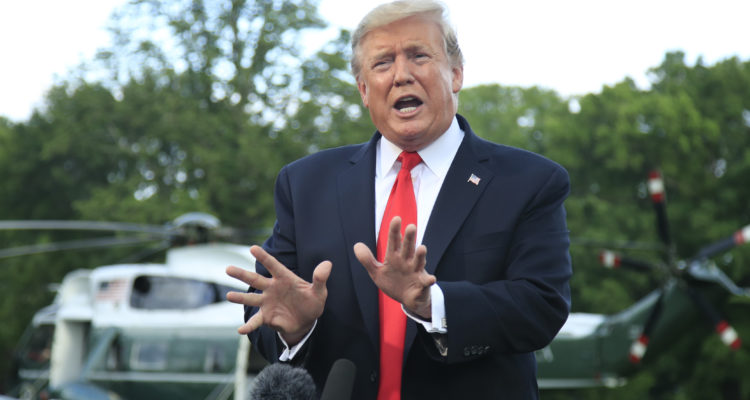Graham urged Trump to “stand firm” and said he received his own briefing over the weekend from John Bolton.
By World Israel News Staff and AP
As questions mount over President Donald Trump’s tough talk on Iran, top national security officials are heading to Capitol Hill to brief Congress. But skeptical Democrats have asked for a second opinion.
The competing closed-door sessions Tuesday, unusual and potentially polarizing, come after weeks of escalating tensions in the Persian Gulf that have raised alarms over a possible military confrontation with Iran.
Lawmakers are warning the Trump administration it cannot take the country into war without approval from Congress, and the back-to-back briefings show the wariness among Democrats, and some Republicans, over the White House’s sudden policy shifts in the Middle East.
Trump, veering between bombast and conciliation in his quest to contain Iran, threatened Monday to meet provocations by Iran with “great force,” but also said he’s willing to negotiate.
The president sent a not-so-subtle warning to the Islamic Republic on Sunday, tweeting that “If Iran wants to fight, that will be the official end of Iran.”
The president appeared to be responding to a rocket attack in Iraq’s Green Zone on Sunday. The Green Zone is a heavily fortified area in Iraq’s capital of Baghdad where the U.S. Embassy and Iraq’s government headquarters are located.
Over the past several weeks, the U.S. has sent an aircraft carrier and other resources to the Persian Gulf region, and evacuated non-essential personnel from Iraq, amid unspecified threats that the administration says are linked to Iran.
The administration is sending Secretary of State Mike Pompeo, Acting Defense Secretary Patrick Shanahan, and other top brass, including Gen. Joseph Dunford, the chairman of the Joint Chiefs of staff, for closed-door briefings Tuesday with both the House and Senate.
But House Democrats, deeply skeptical of the information from the Trump officials, invited former CIA Director John Brennan and former State Department official Wendy Sherman, who negotiated the Iran nuclear deal.
Brennan, an outspoken Trump critic, does not have a formal briefing planned but is prepared to answer questions on Iran – and is willing to do the same for Republicans, said a person familiar with the matter who was not authorized to discuss it publicly. The intent, the person said, is to provide information and not to be partisan.
Tensions have risen in recent weeks as the U.S. ordered an aircraft carrier and bomber squadron to the Mideast following unspecified threats that Iran may target U.S. troops in the region. Trump also announced the imposition of further sanctions on Iran. There were also reports that Trump was presented with war plans by his top security advisers for dealing with Iran militarily.
Trump’s allies believe the Iranian threat is real
Trump’s allies in Congress, including GOP Sen. Lindsey Graham of South Carolina, say the threats from Iran are real. Graham urged Trump to “stand firm” and said he received his own briefing over the weekend from John Bolton, Trump’s national security adviser.
“It is clear that over the last several weeks Iran has attacked pipelines and ships of other nations and created threat streams against American interests in Iraq,” Graham tweeted. “If the Iranian threats against American personnel and interests are activated we must deliver an overwhelming military response.”
But Democratic Rep. Ruben Gallego of Arizona, an Iraq War veteran, tweeted that after having received “the same” intelligence briefing, that was not his conclusion.
“That is not what is being said. This is total information bias to draw the conclusion he wants for himself and the media,” Gallego tweeted.
Graham’s reference to Iran having attacked ships appeared to be a further indication that the U.S. military has concluded that Iran was behind the reported attack May 12 on four commercial vessels off the coast of the United Arab Emirates.
Iran, meanwhile, announced that it has quadrupled its uranium-enrichment production capacity. Iranian officials made a point to stress that the uranium would be enriched only to the 3.67 percent limit set under the 2015 nuclear deal with world powers, making it usable for a power plant but far below what’s needed for an atomic weapon.
The state-run IRNA news agency quoted Behrouz Kamalvandi, the spokesman of the Atomic Energy Organization of Iran, as acknowledging that capacity had been quadrupled.
He said Iran took this step because the U.S. had ended a program allowing it to exchange enriched uranium transferred to Russia for unprocessed yellowcake uranium, as well as ending the sale of heavy water to Oman. Heavy water helps cool reactors producing plutonium that can be used in nuclear weapons.




